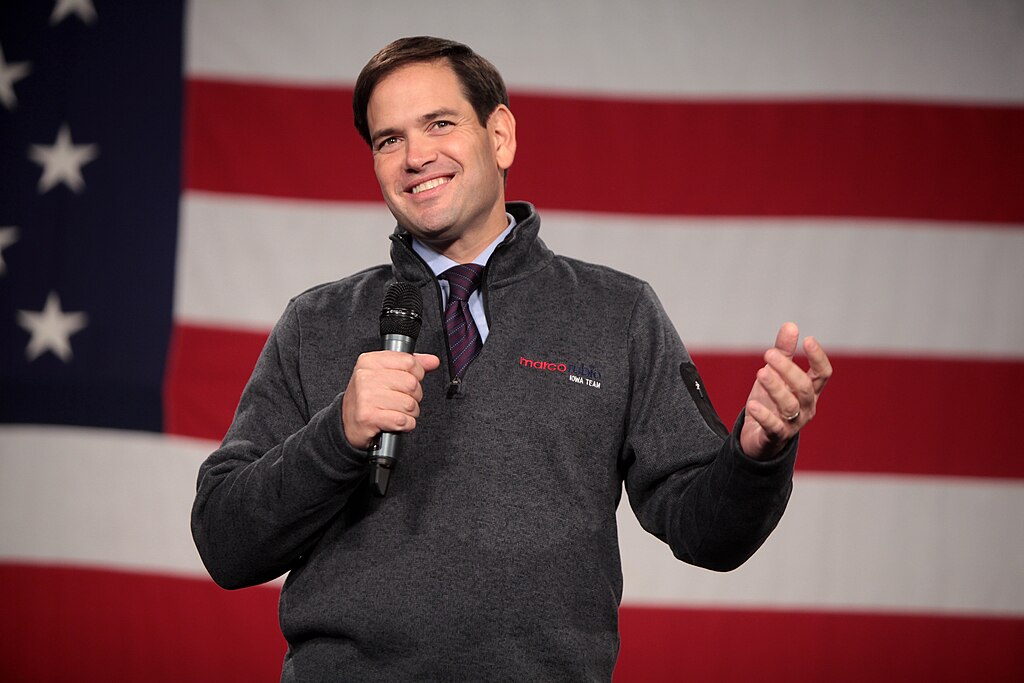President-elect Donald Trump has named Florida Sen. Marco Rubio as his choice for Secretary of State. Known for his hawkish stance on foreign policy and robust views on U.S.-China relations, Rubio’s appointment is expected to bring a new level of assertiveness to America’s diplomatic front. While supporters see Rubio as a strong choice to represent U.S. interests on the global stage, critics worry that his confrontational approach could heighten tensions with key nations.
Rubio, a prominent figure in the Republican Party, has long been outspoken on foreign policy issues, particularly regarding China, Russia, and Latin America. His advocacy for democracy and human rights abroad, coupled with his tough stance on authoritarian regimes, has earned him both supporters and detractors within Washington’s corridors of power. As Secretary of State, he will be tasked with reshaping U.S. foreign policy after four years of President Joe Biden’s more restrained approach.
Trump made the announcement during a press briefing at his Mar-a-Lago resort, emphasizing Rubio’s commitment to American values and his readiness to face international challenges.
Rubio’s Strong Stance on China and Russia
Rubio’s appointment is likely to signal a harder line on China and Russia, two countries he has frequently criticized during his time in the Senate. He has pushed for stricter policies to counter China’s economic and political influence, expressing concern over Beijing’s growing control in Latin America, Asia, and even Africa. On the Senate floor, Rubio has often condemned China’s human rights record, accusing the Chinese Communist Party of oppressive practices, especially regarding the Uyghur Muslim population and Hong Kong.
This hawkish stance may significantly influence U.S. policy towards China, with analysts predicting a renewed emphasis on countering Chinese influence globally. Additionally, Rubio’s vocal opposition to Vladimir Putin and the Russian government aligns with Trump’s continued stance on safeguarding American interests in Eastern Europe.
A Mixed Reaction in Washington
Reaction to the announcement has been swift and divided. Many Republicans have praised the choice, calling it a move to strengthen U.S. foreign policy. “Marco Rubio is a patriot who understands the threats we face today,” said Sen. Lindsey Graham, a close Trump ally. “His leadership at the State Department will be instrumental in restoring American power abroad.”
However, Democrats and some foreign policy experts have expressed concerns about Rubio’s aggressive style. They argue that his approach could lead to strained relationships with allies and increase global tensions, particularly in sensitive regions like the Middle East and Asia. Sen. Chris Murphy, a Democrat from Connecticut and member of the Foreign Relations Committee voiced his reservations, stating, “This appointment is a clear sign that the Trump administration intends to pursue an aggressive and potentially destabilizing foreign policy.”
Rubio’s Vision for the State Department
In a brief statement, Rubio said he was “honored” by the nomination and eager to “advance America’s interests and values around the world.” He outlined his intention to stand up against authoritarian regimes and support democracies worldwide, a message that resonates with many but has also raised eyebrows among international leaders concerned about potential diplomatic friction.
If confirmed, Rubio will be one of the youngest Secretaries of State in recent history, marking a generational shift in the role. Known for his passionate speeches and direct approach, he is expected to bring a new energy to Foggy Bottom.



 Macron Urges Emergency UN Security Council Meeting as US-Israel Strikes on Iran Escalate Middle East Tensions
Macron Urges Emergency UN Security Council Meeting as US-Israel Strikes on Iran Escalate Middle East Tensions  Zelenskiy Urges Change in Iran After U.S. and Israeli Strikes, Cites Drone Support for Russia
Zelenskiy Urges Change in Iran After U.S. and Israeli Strikes, Cites Drone Support for Russia  Pentagon Leaders Monitor U.S. Iran Operation from Mar-a-Lago
Pentagon Leaders Monitor U.S. Iran Operation from Mar-a-Lago  Netanyahu Suggests Iran’s Supreme Leader Khamenei May Have Been Killed in Israeli-U.S. Strikes
Netanyahu Suggests Iran’s Supreme Leader Khamenei May Have Been Killed in Israeli-U.S. Strikes  Israel Declares State of Emergency as Iran Launches Missile Attacks
Israel Declares State of Emergency as Iran Launches Missile Attacks  U.S.-Israel Strike on Iran Escalates Middle East Conflict, Trump Claims Khamenei Killed
U.S.-Israel Strike on Iran Escalates Middle East Conflict, Trump Claims Khamenei Killed  U.S. Lawmakers Question Trump’s Iran Strategy After Joint U.S.-Israeli Strikes
U.S. Lawmakers Question Trump’s Iran Strategy After Joint U.S.-Israeli Strikes  Trump Says U.S. Combat Operations in Iran Will Continue Until Objectives Are Met
Trump Says U.S. Combat Operations in Iran Will Continue Until Objectives Are Met  Russia Signals Openness to U.S. Security Guarantees for Ukraine at Geneva Peace Talks
Russia Signals Openness to U.S. Security Guarantees for Ukraine at Geneva Peace Talks  Israel Strikes Hezbollah Targets in Lebanon After Missile and Drone Attacks
Israel Strikes Hezbollah Targets in Lebanon After Missile and Drone Attacks  Trump Floats “Friendly Takeover” of Cuba as Rubio Reportedly Engages in Talks
Trump Floats “Friendly Takeover” of Cuba as Rubio Reportedly Engages in Talks  Trump Warns Iran as Gulf Conflict Disrupts Oil Markets and Global Trade
Trump Warns Iran as Gulf Conflict Disrupts Oil Markets and Global Trade  Pakistan-Afghanistan Tensions Escalate as Taliban Offer Talks After Airstrikes
Pakistan-Afghanistan Tensions Escalate as Taliban Offer Talks After Airstrikes  Germany and China Reaffirm Open Trade and Strategic Partnership in Landmark Beijing Visit
Germany and China Reaffirm Open Trade and Strategic Partnership in Landmark Beijing Visit  Trump to Address Nation as U.S. Launches Strikes in Iran, Axios Reports
Trump to Address Nation as U.S. Launches Strikes in Iran, Axios Reports  EU Urges Maximum Restraint in Iran Conflict Amid Fears of Regional Escalation and Oil Supply Disruption
EU Urges Maximum Restraint in Iran Conflict Amid Fears of Regional Escalation and Oil Supply Disruption  Australian PM Calls Alleged Western Australia Terror Plot “Deeply Shocking” After Arrest
Australian PM Calls Alleged Western Australia Terror Plot “Deeply Shocking” After Arrest 
































